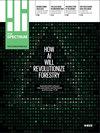前言:AD-X2 事件
IF 2.6
4区 工程技术
Q2 ENGINEERING, ELECTRICAL & ELECTRONIC
引用次数: 0
摘要
1947 年,一位名叫杰斯-M-里奇(Jess M. Ritchie)的推土机操作员和一位名叫梅尔-兰德尔(Merle Randall)的著名物理化学家开始销售 AD-X2,他们声称这种添加剂可以延长铅酸蓄电池的寿命。消费者对其效果赞不绝口,然而国家标准局在对该产品进行测试时却无法证实这一说法。这场争论演变成了一场充满政治色彩的多年事件,涉及参议院听证会、邮局禁令、国家标准局局长辞职,以及在 400 多名科学家威胁辞职以示抗议后他的复职。在新闻界上演的这出大戏,是一个自强不息的 "大卫 "与一个越权的政府 "巨人 "的对决。但最终,科学赢了。本文章由计算机程序翻译,如有差异,请以英文原文为准。
Past Forword: The AD-X2 Affair
In 1947, a bulldozer operator named Jess M. Ritchie and a prominent physical chemist named Merle Randall began to market AD-X2, an additive they claimed extended the life of lead-acid batteries. Consumers raved about the results, and yet the National Bureau of Standards could not substantiate the claims when it tested the product. The dispute devolved into a politically fraught, multiyear affair involving Senate hearings, a post office ban, the resignation of the NBS director, and his reinstatement after more than 400 scientists threatened to resign in protest. The drama that played out in the press pitted an up-from-your-bootstraps David against an overreaching governmental Goliath. In the end, though, science won.
求助全文
通过发布文献求助,成功后即可免费获取论文全文。
去求助
来源期刊

IEEE Spectrum
工程技术-工程:电子与电气
CiteScore
2.50
自引率
0.00%
发文量
254
审稿时长
4-8 weeks
期刊介绍:
IEEE Spectrum Magazine, the flagship publication of the IEEE, explores the development, applications and implications of new technologies. It anticipates trends in engineering, science, and technology, and provides a forum for understanding, discussion and leadership in these areas.
IEEE Spectrum is the world''s leading engineering and scientific magazine. Read by over 300,000 engineers worldwide, Spectrum provides international coverage of all technical issues and advances in computers, communications, and electronics. Written in clear, concise language for the non-specialist, Spectrum''s high editorial standards and worldwide resources ensure technical accuracy and state-of-the-art relevance.
 求助内容:
求助内容: 应助结果提醒方式:
应助结果提醒方式:


